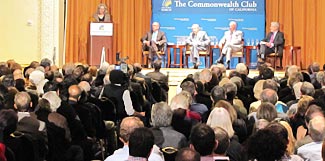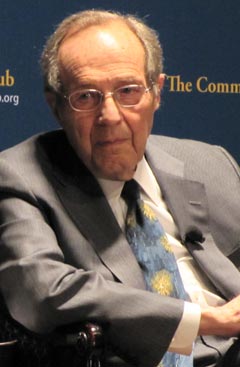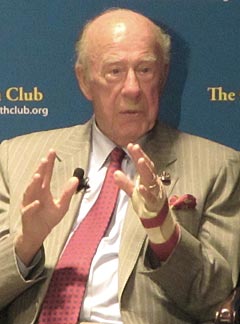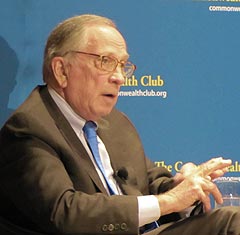March 7, 2012 San Francisco.
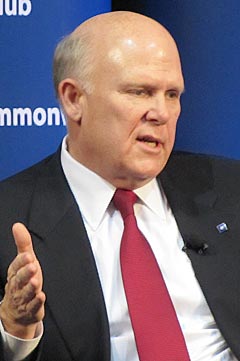 |
| General Motors Chairman Dan Akerson |
General Motors CEO and Chairman Dan Akerson appeared at the Commonwealth Club in San Francisco for an interview with Greg Dalton of Climate One.
This video excerpt features Akerson’s comments on many topics, including energy efficiency improvements in the GM line, lithium batteries, climate change, the Heartland Institute, and his personal views on military deployments.
“The first time I was interviewed by the press I was stunned with the following reaction, the guy says do you believe in global warming and I said ‘well ya I do’. Several GM executives says ‘you don’t say that in public’…I think it’s actually healthy to have different points of view and perspectives around the table”
Also see the full length Commonwealth Club version
Select excerpts:
00:48 “I remember President Obama, when I was in private equity, in I think in an unguarded statement of exasperation with the whole industry I guess and at the depth of the recession said “Why can’t they build a car like the Corolla?”, well we did. The best selling compact car in America today is the Cruise, Chevy Cruise,…. and it makes about forty miles per gallon.”
01:42 “We sold as many Volts in the first year as Toyota sold Priuses in their first year. I mean sometimes you have to be a pioneer to do the right thing and kinda shape and mold our own future, so we’ll make investments where we thing the long term future is in our interest.”
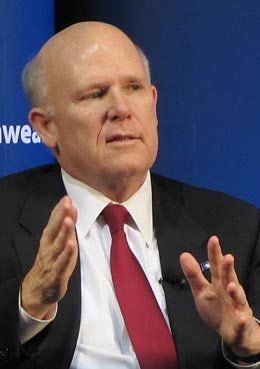 |
| “There are economic laws just like there are physical laws, and one of them is you don’t tax production – you tax consumption if you want to impact behavior” ~ Dan Akerson |
07:46 “This is the new GM, and rather than sit in the corner and be obstreperous. We want to be part of the solution, we don’t not want to be part of the problem. We live in this country. I have grandchildren and children, and I want them to inherit a better earth than we did.”
Fuel Efficiency and Cleaner Energy
08:55 “We are pushing everything on cleaner energy, more fuel efficient. We have many cars now that are EPA rated at 40 and above, 42. The new Eco Cruise is at 42. We’re coming out with a clean diesel next year for the Cruise. The collator impact, positive impact of all our work on Volt. We’re putting in what we call e-assist on Trucks, we’re putting ’em on midsized sedans and small cars. For example, the new next generation – if you really want a good car that’ll get good mileage – is the new Malibu that’s coming out. I mean this car has just gotten rave reviews. And we put a battery string in the back. In a congested city like San Francisco, or make any big city in America, we estimate that one in every five minutes your sitting still, or in traffic or a stoplight. Well, you go to, you’ve got your 12 volt battery that’ll run your radio and everything else, but we go to a string of lithium ion batteries in your trunk, and your mileage will jump from anywhere to 25 to 33%. Again, and it’s cleaner, and you’re in the city when you’re on the mode. So you’re seeing the evolution here, and you can see where it’s going over time, and the more creative we are, and the greater energy density that we can get into a cell battery, the better off we’re gonna be.”
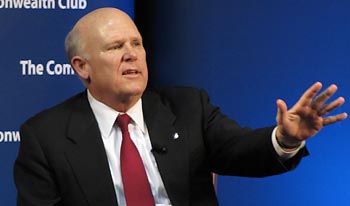 |
| “I have grandchildren and children, and I want them to inherit a better earth than we did.” ~ Dan Akerson |
Lithium Ion Car Battery Density:
10:57 Dan Akerson “..So here in California the Envia corporation ..that’s a very promising technology, we don’t know if it’s industrialized yet, be we’ve seeded the money…”
Greg Dalton: “We should clarify it’s a company that claims to have made a breakthrough in energy densisty in car batteries”
Dan Akerson ” Yes Lithium – so we’re excited about that because our battery in the Volt is a 400 pound battery, that’s a lot of weight, it gives us 16 kilowatt hours of energy, well, what happens if it’s so dense it’s four times as dense, well gee whiz, we got 64 kilowatts, well what’s that do, that means the battery can run a lot further, instead of 40 miles maybe it’ll run maybe 140 miles….I believe in my lifetime, technology, there’s an ever escalating improvement, and you gotta be optimistic about it that battery technology will improve over the next 5 10 15 20 years.”
War and Peace
11:50 “Unlike a lot of people in this country today, I believe in our political leadership, that they’ll come to the right decision. I actually think it’s a benefit to have served in the military, because I think those are the folks that are the last to want to go to war. And I and would think deeply and hard about committing our young men and women to combat whether it’s Iran, or Vietnam, or Iraq. That’s the citizen in me – I don’t want to speak as a – I want to restrict my commentary to my role as the CEO of General Motors, but I hold these young men and women in the highest regard. It breaks your heart when you hear, I mean they give so much to us”
“…. I share your concern, and pray for peace”.
Update 4/1/12: Dan Akerson followed through on his pledge to look into the Heartland Institute – and as a result GM has cut funding for the group.
‘Citing its corporate stance that climate change is real, General Motors announced Wednesday that its General Motors Foundation would no longer be funding the Heartland Institute, a free-market think tank that has attacked human-caused global warming as “junk science.”’
via GM pulls support for Heartland Institute – latimes.com.
report by James George

